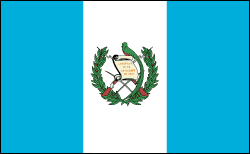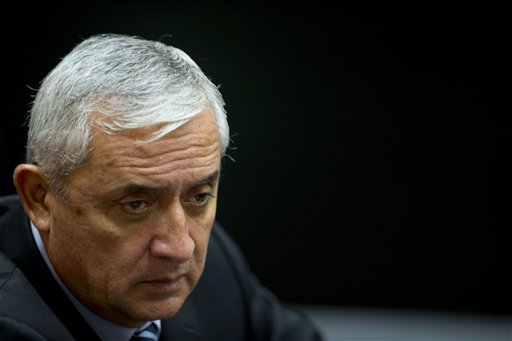Guatemala News & Current Events


Army Blamed for Most of the Abuses in Civil War
In 1999, a Guatemalan truth commission blamed the army for 93% of the atrocities and the rebels (the Guatemalan National Revolutionary Unit) for 3%. The former guerrillas apologized for their crimes, and President Clinton apologized for U.S. support of the right-wing military governments. The army has not acknowledged its guilt. Alfonso Portillo Cabrera, closely associated with the former dictatorship of Efrain Rios Montt (1982–1983), became president in Jan. 2000. In Aug. 2000, Portillo apologized for the former government's human rights abuses and pledged to prosecute those responsible and compensate victims.
Guatemala Signs Several Trade Agreements
To stimulate the economy, Guatemala, along with El Salvador and Honduras, signed a free trade agreement with Mexico in June 2000. In Aug. 2001, plans for tax increases prompted widespread, and often violent, protests.
In July 2003, the country's highest court ruled that former coup leader and military dictator Rios Montt, responsible for the massacre of tens of thousands of civilians during the civil war, was eligible to run for president in November. The ruling conflicted with the constitution, which bans anyone who seized power in a coup from running for the presidency. But in November, Rios Montt was soundly defeated by two candidates, conservative Oscar Berger and center-leftist Alvaro Colom. In the runoff election in December, Berger was elected president.
In 2005, the government ratified a free-trade agreement (CAFTA) with the U.S.
Three Salvadoran politicians, all members of the Central American Parliament, and their driver were found murdered on a road near Guatemala City in Feb. 2007. Four Guatemalan police officers were arrested in connection with the murders and later shot dead in their prison cells. Three other officers were named as suspects. Guatemala's security minister, the national police chief, and the director of the country's prisons all resigned in the scandal.
Fourteen candidates, including 2002 Nobel Peace Prize winner Rigoberta Menchú, competed in the first round of presidential elections in September 2007. Otto Pérez Molina, a former general, and businessman Álvaro Colom advanced to the second round. After a vitriolic campaign, Álvaro Colom, of the National Unity for Hope party, defeated Otto Pérez Molina in the presidential election on November 4, 2007, 52% to 47%.
Pérez Molina Elected President On His Second Try
After coming in second in 2007, Otto Pérez Molina was elected president in November 2011, receiving 53.7% of the vote. Pérez Molina beat Manuel Baldizón, a young businessman who was running as a fresh, populist alternative. The leader of the right-wing Patriot Party, Pérez Molina's election was a sign that voters desired change, going against their current centre-left government.
Even though Pérez Molina won the 2011 election, he was seen as a divisive figure during his campaign. A former general, Pérez Molina played a prominent role during the country's civil war. In July 2011, Waqib Kej, a Guatemalan indigenous organization, sent a letter to the United Nations accusing Pérez Molina of genocide and torture in 1982, during the civil war. Some voters feared him for his role in the war and because of the allegations against him. Others did not want the reminder of the country's 1960–96 civil war, in which there were mass murders and approximately 200,000 people died. The first ex-soldier elected since democracy was restored in 1986, Pérez Molina vowed to fight hard against organized crime. This was a huge selling point with some voters because Guatemala has one of the highest murder rates in the world.
7.4 Magnitude Earthquake Strikes Guatemala
On November 7, 2012, a magnitude 7.4 earthquake rocks Guatemala. At least 48 people were killed. With at least 150 seriously injured and 23 people missing, government officials said the death toll would likely rise. Houses were destroyed. Schools, roads, and government buildings were damaged. When a prison wall collapsed, 98 inmates had to be transferred to another jail. At a news conference, President Molina said, "This is the largest earthquake we have had since the one in 1976."
San Marcos, near the border of Mexico, was the hardest hit. Tremors from the earthquake were felt as far as Mexico City and San Salvador. President Molina placed the San Marcos area under a high disaster alert and traveled there to see the damage.
Court Throws Out Montt's Genocide Conviction
On May 20, 2013, the highest court in Guatemala overturned the genocide conviction of General Efraín Ríos Montt. The ruling was a legal victory for Montt, the former dictator, and a defeat for human rights advocates who saw the original conviction as a positive sign that the country's courts would punish Guatemala's most powerful for illegal activity.
Montt had been in prison since a three-panel tribunal found him guilty on May 10, 2013. He had been found guilty as commander in chief for several rapes and massacres as well as the displacement of the Maya-Ixil community while he ruled in 1982 and 1983. He had been sentenced to 80 years in prison, but the latest ruling meant he would return to house arrest. Montt had been under house arrest since January 2012 when the case against him started.
President Pérez Molina Resigns Due to Corruption Allegations
In April 2015, international prosecutors, working with the United Nations, released evidence of a corruption ring where discounted tariffs had been exchanged for bribes with importers. Among the evidence was wiretaps and financial statements. The following month, Vice President Roxana Baldetti resigned. Former Minister of Foreign Affairs Alejandro Maldonado replaced her. On August 21, Baldetti was arrested for her involvement in the corruption ring. That same day, prosecutors shared evidence of President Otto Pérez Molina's involvement.
On Sept. 1, in a unanimous vote, Congress stripped Pérez Molina of his immunity. The following day he resigned. On Sept. 3, 2015, Pérez Molina was arrested. Vice President Alejandro Maldonado became acting president.

Former President Otto Pérez Molina
Source: AP Photo/Moises Castillo
On Sept. 6, president elections were held. The results were close. National Convergence Front party nominee Jimmy Morales received 23.8% of the vote, National Unity of Hope nominee Sandra Torres 19.8%, and Renewed Democratic Liberty party nominee Manuel Baldizón 19.6%. A runoff was scheduled for Oct. 25.
On Oct. 2, 2015, a landslide killed 131 people and destroyed 125 homes. The death toll was expected to climb with more than 300 people still missing. The landslide occurred after two weeks of consistent rain caused a hillside to collapse. It was one of Guatemala's worst natural disasters in years.
Jimmy Morales won the Oct. 25 presidential runoff. Morales received 67% of the vote, Sandra Torres received 33%. A former TV comedian, Morales ran for mayor of Mixco in 2011. Two years later he was named secretary-general of the National Convergence Front party. Morales took office on Jan. 14, 2016.
Bernardo Arévalo, a political newcomer and the son of former president Juan José Arévalo, emerged as Guatemala's new president in 2024 after a surprising electoral victory. His campaign focused on combating corruption, promoting social justice, and addressing the country’s critical issues, such as poverty and inequality. Arévalo's administration is characterized by a commitment to democratic values and reform, seeking to restore citizens' trust in government institutions. His vision includes expanding access to education and healthcare, as well as fostering economic development through sustainable practices. As he takes office, many are hopeful that Arévalo will lead Guatemala towards a more transparent and equitable future.
See also Encyclopedia: Guatemala
U.S. State Dept. Country Notes: Guatemala
National Institute of Statistics (In Spanish Only) www.segeplan.gob.gt/ine/index.htm .







